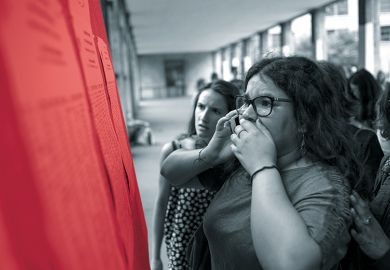“Serious” concerns have been raised about the validity of the Westminster government’s process for accrediting universities to deliver teaching training in England after several of those that lost out received positive Ofsted inspections.
The University of Greenwich – one of those stripped of its initial teacher training (ITT) accreditation late last year – said its own recent “good” rating by the inspectorate cast doubt on the reliability of the controversial “market review” conducted by the Department for Education (DfE) that was designed to remove poor quality courses.
This review was a “desk-based exercise”, the university said, compared with the in-person, week-long visit by 15 Ofsted inspectors who rated all aspects of its provision as “good”, including its teacher apprenticeships, which it will be no longer be able to deliver when the new regime begins in 2024.
Greenwich highlighted that the universities of East Anglia, Cumbria, Sussex and the West of England, as well as London South Bank and Brunel universities, had all similarly lost their accreditation in the review and then received “good” or “outstanding” Ofsted ratings.
In contrast, it said, six of the 19 providers that were accredited by the government had since received ratings of “inadequate” or “requires improvement”.
Jane Harrington, Greenwich’s vice-chancellor, has written to Gillian Keegan, the education secretary, asking for clarity about the apparent contradictions.
“We have ongoing and serious concerns about the rigour, reliability and validity of the desk-based ITT accreditation process undertaken last year that claimed to be assessing the quality of initial teacher training provision in higher education institutions,” she said.
“We have written to the secretary of state and the Education Select Committee to outline the contradictions between the results of the incredibly rigorous independent Ofsted inspection process, involving a week-long visit by multiple inspectors, and the outcome of the paper-based accreditation process last year.”
Greenwich said it was close to agreeing a partnership with an accredited institution so it could continue to deliver teacher training, having done so already for 120 years.
“The market review process was inconsistent and unfair, and the removal of accreditation means we will need to spend a significant amount of money on a new partnership process that isn’t needed,” Professor Harrington added.
Derek Moore, Greenwich’s pro vice-chancellor of education, health and human sciences, called for the universities since given “good” ratings be offered the chance to resubmit for accreditation and for the changes to be postponed for a year to allow for this to happen.
“By removing accreditation, there will be more barriers to getting our best and brightest into teaching at a time where the country is struggling to recruit and retain educators,” Professor Moore said.
“This decision will only serve to further disadvantage school children and put even more pressure on schools struggling to recruit new teachers.”
He said money now being spent on partnerships would be better used to support trainees.
“We are asking for a fair and equitable process that allows long-established, independently assessed universities, like ours, to continue training the teachers of the future, and to be allowed to play our part to address the current teacher recruitment and retention crisis.”
A DfE spokesperson said: “Our reformed initial teacher training will increase the confidence of those entering the workforce, supporting longer term retention and ultimately raising standards for every child.
“179 providers were approved following our robust accreditation process and we will continue to work towards strengthening the quality of training to ensure we meet the demand for training places from September 2024.”
Register to continue
Why register?
- Registration is free and only takes a moment
- Once registered, you can read 3 articles a month
- Sign up for our newsletter
Subscribe
Or subscribe for unlimited access to:
- Unlimited access to news, views, insights & reviews
- Digital editions
- Digital access to THE’s university and college rankings analysis
Already registered or a current subscriber? Login








